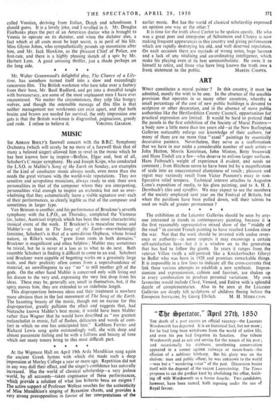MUSIC
SIR ADRIAN BOULT'S farewell concert with the B.B.C. Symphony Orchestra (which will surely be no more of a farewell than that of many a beloved singer) allowed him to revel in the music which he has best known how to inspire—Brahms, Elgar and, best of all, Schubert's C major symphony. He and Joseph Krips, who conducted the L.S.O. in Mahler's Song of the Earth on Sunday, are examples of the kind of conductor music always needs, even more than she needs the great virtuosi with the world-wide reputations. They are sensitive and scrupulous musicians, always ready to sink their own personalities in that of the composer whom they are interpreting, personalities vital enough to inspire an orchestra but not so over- whelming that they automatically leave a visible signature over each of their performances, as clearly legible as that of the composer and sometimes in larger type.
, Van Beinum is another, and his performance of Bruckner's seventh symphony with the L.P.O., on Thursday, completed the Viennese (or, better, Austrian) triptych which has been the most characteristic musical event of the week. If Bruckner's is masculine music and Mahler's—at least in The Song of the Earth—overwhelmingly feminine, Schubert's is that of a semi-divine Orpheus, whose broad nature, in Rilke's words, " grew from roots in both domains." Bruckner is magnificent and often helpless ; Mahler may sometimes be trivial, but he is never at a loss as to what to do next. Both resemble Schubert in finding it difficult to come to an end. Schubert and Bruckner were capable of begetting works on a genuinely large scale, and their prolixity often comes from a superabundance of material, an unwillingness to say " no " to still another gift of the gods. On the other hand Mahler is concerned only with living out his dream to the very end, expressing the very last drop from his ideas. These may be, generally are, small in themselves, but, if the spirit moves him, they are extended to an indefinite length. This disproportion between ideas and their treatment is nowhere more obvious than in the last movement of The Song of the Earth. The haunting beauty of the music, though not an excuse for this disproportion, greatly palliates the effect and suggests that, had Nietzsche known Mahler's best music, it would have been Mahler rather than Wagner that he would have described as " our greatest melancholist in music, full of flashes, delicacies and words of com- fort in which no one has anticipated him." Kathleen Ferrier and Richard Lewis sang quite outstandingly well, she with deep and almost passionate feeling and he with a fullness and beauty of tone which not many tenors bring to this most difficult part.
* * * * At the Wigmore Hall on April 19th Arda Mandikian sang again the ancient Greek hymns with which she made such a deep impression at Morley College a year or more ago. Repetition did not in any way dull their effect, and the singer's confidence has naturally increased. Has the world of classical scholarship—a very jealous • world, by all accounts—taken cognisance of these performances, which provide a solution of what has hitherto been an enigma ? The active support of Professor Wellesz vouches for the authenticity of Miss Mandikian's singing of Byzantine chants, and provides a very strong presupposition in favour of her interpretations of the earlier music. But has the world of classical scholarship expressed an opinion one way or the other ?
It is time for the truth about Cortot to be spoken openly. He who was a great poet and interpreter of ;Schumann and Chopin is now making frequent appearances in this country and giving perfomances which are rapidly destroying his old, and well deserved reputation. On each occasion there are myriads of wrong notes, huge lacunae and a lack of any vitalising and co-ordinating intelligence, which make his playing even at its best somnambulistic. He owes it to himself to retire, and those who have long known the truth owe a










































 Previous page
Previous page